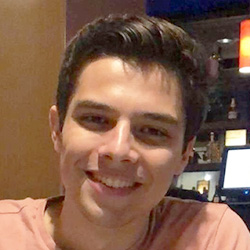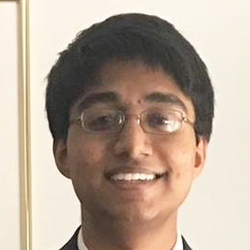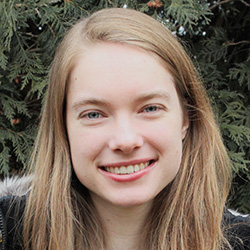Four Students Receive Honorable Mention in CRA Undergraduate Research Awards
The nationwide award program recognizes undergraduate students who show outstanding research potential in computing
Computer science undergraduates Michael Cuevas, Amil Dravid, Souradip Ghosh, and Elizabeth Petersen received honorable mentions in the Computer Research Association’s 2021 Outstanding Research Award Program. The nationwide award program recognizes undergraduate students who show outstanding research potential in computing.
“Landing several students in this amazing cohort group as honorable mention is a testament to the quality of our undergraduate program and research opportunities available to our students,” said Samir Khuller, Peter and Adrienne Barris Chair and Professor of Computer Science.
Nominations are made for students who made significant contributions to more than one research project, authored multiple papers, made presentations at major conferences, produced software that gained widespread use, or were involved in summer research as teaching assistants, tutors, or mentors.

Michael Cuevas (’21)
Adviser: Peter Dinda
Cuevas’s research interests lie at the boundary between hardware and software, with a focus on projects that involve compilers, operating systems, and kernel development. He has made several contributions to the Nautilus Aerokernel since starting his undergraduate research career with Northwestern’s Prescience Lab. Cuevas presented a recent project at the Association for Computing Machinery’s SC ’20 conference: Proceedings of the International Conference for High Performance Computing, Networking, Storage and Analysis. The project, Compiler-based Timing, introduces a system that replaces interruptions from the hardware timer with callbacks from compiler-injected code. Cuevas’s current focus is adding a Linux-compatible process abstraction to Nautilus so that other research projects can more easily utilize benchmarks and applications developed for Linux.

Amil Dravid (’23)
Adviser: Aggelos Katsaggelos
Dravid's current interests are machine learning, artificial intelligence, and applications to medical imaging as well as mathematical foundations. His research path began as a high schooler when he published a work in the journal Microscopy Today about improving biological imaging throughput via deep learning. Dravid has worked with mesh-based learning methods for interpreting Alzheimer's disease and dementia, which was published and invited for oral presentation at the International Workshop on Shape in Medical Imaging associated with the International Conference on Medical Image Computing and Computer Assisted Intervention (MICCAI). Additionally, his work with a team on a COVID-19 detection algorithm, “DeepCOVID-XR,” was published in the journal Radiology. He also has ventured into the statistical foundations of generative adversarial networks, the technology best known for generating “deepfakes.” He aims to continue artificial intelligence and machine learning research with societal impact in mind.

Advisers: Peter Dinda, Simone Campanoni
Ghosh’s research interests lie in compilers, operating systems, optimization techniques, automatic parallelization, and new technologies at the intersection of different layers of the computer systems stack. As an undergraduate researcher, he has made contributions to long-term research projects at Northwestern such as the Interweaving Project, the Nautilus Aerokernel, Noelle, and TimeSqueezer. He is an active member of several research groups including the NU Compilers Group, the Prescience Lab, the NU Parallelism Group, and the NU TimeSqueezing Group. As a fourth-year computer science major and economics minor, Ghosh has focused his studies on computer systems and worked as an undergraduate researcher and peer mentor in the Department of Computer Science. Ghosh plans to pursue a PhD in computer science after graduation.

Adviser: Kris Hammond
Petersen’s research focuses on conversational interfaces, specifically on how to improve the user’s experience when interacting with a conversational interface. Petersen developed an interest in this area when she began working on a simple chatbot designed to answer FAQs for hospital patients. From there, Petersen became interested in how to make the conversation between the user and the conversational interface more natural. This led her to a new project, called Advisor. Its first objective was to create a conversational system aimed at personalized career advice for Northwestern students. To make the system appear more human, Petersen designed internal components of the system to handle support for episodic memory, the use of context for fluid conversations, and profile building for the user. The second objective was to produce modularized components which are general enough to be reapplied in different conversational applications in other contexts with minimal adjustments. Petersen intends to revisit this project during graduate study, aiming to ensure the second objective by plugging the Advisor system into a different context — class selection instead of job search.
